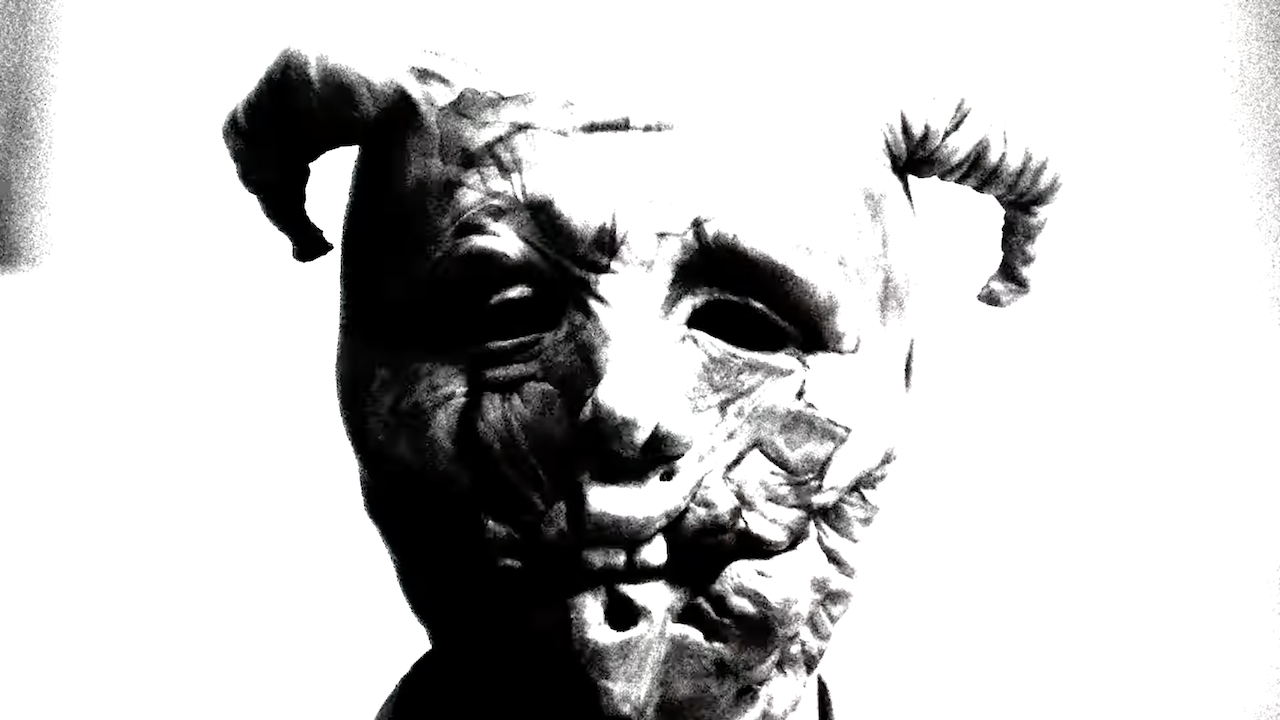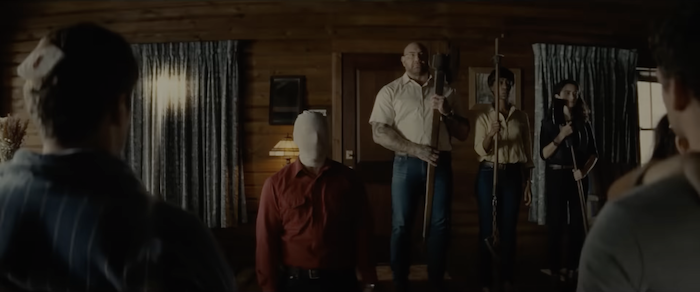‘Knock At The Cabin’: Solid Thrills, Mixed Messages
Image Source: YouTube
It’s the end of the world as we know it. M. Night Shyamalan returns to the big screen with his latest thriller, Knock At The Cabin. Directed by Shyamalan and written by him alongside Steve Desmond and Michael Sherman, the movie is an adaptation of The Cabin at the End of the World by Paul G. Tremblay. The film follows newlyweds Eric (Jonathan Groff) and Andrew (Ben Aldridge), who go on vacation to a cabin in the woods with their adopted daughter Wen (Kristen Cui). While there, their cabin is broken into a group of people wielding various tools. Consisting of Leonard (Dave Bautista), Sabrina (Nikki Amuka-Bird), Adriane (Abby Quin), and Redmond (Rupert Grint), the group ties up the fathers and informs them that they’ve been chosen to prevent the apocalypse. But the only way for them to do so is by killing one of their own.
Each time the family refuses to let one of their own die, the group kills one of its own members. And with each group member killed, a new famine is unleashed upon the world. Made to see every single disaster as it happens on the news, the family finds themselves conflicted over if they should kill one of their own to save the world or allow the world to be destroyed. Without giving away any spoilers, one of these outcomes is achieved, and the family is greatly tested throughout. Every actor gives a solid performance, from Bautista’s unnervingly quiet and foreboding cadence to Groff and Aldridge’s chemistry as a loving couple. While the moments of violence are sparse, they are fairly effective and help get across the stress and severity of the situation. The movie also makes the audience wonder if the apocalypse is truly occurring or if the group is a suicide cult using timely news reports to feed its delusions.
RELATED:
SPOILERS AHEAD
By the time the movie reaches its third act, it becomes blatantly clear that these apocalyptic events are happening and that the family needs to sacrifice one of their own to save the world. But the movie also does an effective job of making the audience second-guess the premise. Throughout, we are shown flashbacks to Eric and Andrew’s pasts and the struggles they’ve faced as a gay couple. One specific incident involved Andrew being assaulted at a bar by a homophobic patron. Upon looking into Leonard’s belongings, he discovers that Leonard is, in fact, the same person who assaulted him. This leads Andrew to believe that Leonard is a delusional religious sycophant who entered a cult-like echo chamber alongside four others who shared his apocalyptic beliefs. However, this turns out to be a misdirect as Leonard’s recital of a news report proves that he and his group can accurately predict catastrophic events. Once the other three group members are killed, Leonard says they have mere minutes following his death to decide before he slits his own throat.
While Andrew is apathetic towards the world due to how it’s treated him, Eric believes there is more good in the world and is therefore, worth saving. Wanting Wen to grow up in a brighter world, Eric tearfully asks Andrew to kill him and end the apocalypse, which Andrew reluctantly does. Now, this ending is different from that of the novel, in which Wen is the one who is killed in Eric’s place. And while I do understand that a child being murdered by her parents isn’t something one would want to show on screen, having Eric take her place comes with its own set of issues.
Image Source: YouTube
To start with, many have pointed out that Eric’s assisted suicide could play into the Bury Your Gays trope. While Eric’s death isn’t treated as expandable or as being brought on by homophobia (Leonard says at one point that their family was chosen because of how pure and loving they are), Eric being the one to die does go against the message of the original novel, which was that marginalized people are often treated by the world as sacrificial lambs. Wen being killed because of the world’s inability to function without her sacrifice is a bleaker ending, but more in line with that original message. Whereas Eric choosing to die out of his belief in the world’s inherent goodness makes the final sacrifice less a condemnation of how the world treats the marginalized and more a reassurance that everything will work out in the end, which goes directly against the novel’s themes and treats Eric as the very kind of sacrificial lamb that the novel opposed.
Overall, Knock At The Cabin is a thrilling horror flick with good performances, eery music, engaging camerawork, and a palpable atmosphere. But its flaws come from its treatment of Eric and disregard for the novel’s original message. This isn’t to say I would’ve rather seen Wen be brutally killed by her adoptive parents. But something does feel lost from the movie as a less confrontational adaption of such a brutal but honest story. As a thrilling movie, Knock At The Cabin does deliver on its premise. But as an adaptation, it feels like Shyamalan should’ve either committed to the original story’s bleak brutality or created his own entirely unique work. Plus, there isn’t an ending twist, and that’s probably the scariest part of all.
Rating: 6/10
READ NEXT:
Source(s): Knock at the Cabin














